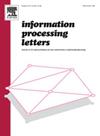半群和单体的自由积与确定性无上下文词问题
IF 0.6
4区 计算机科学
Q4 COMPUTER SCIENCE, INFORMATION SYSTEMS
引用次数: 0
摘要
证明了具有确定性无上下文词问题的所有有限生成半群的类在自由积下是封闭的,回答了 T. Brough、A. J. Cain 和 M. Pfeiffer 的一个问题。另一方面,证明了具有确定性无上下文词问题的所有有限生成单元的类在单元自由积下不是封闭的。本文章由计算机程序翻译,如有差异,请以英文原文为准。
Free products of semigroups and monoids with a deterministic context-free word problem
The class of all finitely generated semigroups with a deterministic context-free word problem is shown to be closed under free products, answering a question of T. Brough, A. J. Cain, and M. Pfeiffer. On the other hand, it is proved that the class of all finitely generated monoids with a deterministic context-free word problem is not closed under monoid free products.
求助全文
通过发布文献求助,成功后即可免费获取论文全文。
去求助
来源期刊

Information Processing Letters
工程技术-计算机:信息系统
CiteScore
1.80
自引率
0.00%
发文量
70
审稿时长
7.3 months
期刊介绍:
Information Processing Letters invites submission of original research articles that focus on fundamental aspects of information processing and computing. This naturally includes work in the broadly understood field of theoretical computer science; although papers in all areas of scientific inquiry will be given consideration, provided that they describe research contributions credibly motivated by applications to computing and involve rigorous methodology. High quality experimental papers that address topics of sufficiently broad interest may also be considered.
Since its inception in 1971, Information Processing Letters has served as a forum for timely dissemination of short, concise and focused research contributions. Continuing with this tradition, and to expedite the reviewing process, manuscripts are generally limited in length to nine pages when they appear in print.
 求助内容:
求助内容: 应助结果提醒方式:
应助结果提醒方式:


